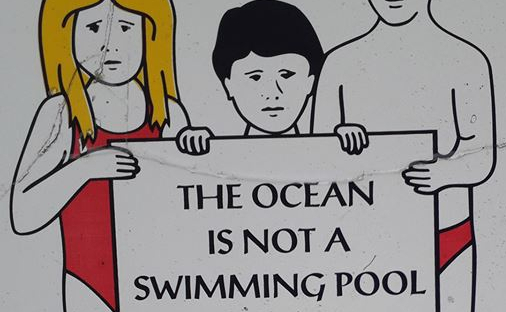Abby Barras is a full-time, first year PhD student based in the School of Applied Social Sciences. Her research focuses on transgender and gender non-conforming people and their experiences of participation in grassroots sport in the UK. She is also a co-rep for PhD students on the Centre for Transforming Sexuality and Gender Management group.
Below, in a post republished from her own blog, Abby reflects on her first term of doctoral study at Brighton and shares some approaches she has found invaluable.
The Ocean is not a Swimming Pool
Abby Barras
 Living by the sea, I don’t have to look very hard for metaphors when writing about my PhD journey. The title of my blog (Sink or Swim) gives it away. I wrote in my first post that my blog would be about my PhD journey, and what happens when you start (and hopefully finish) a PhD. What do you actually do?
Living by the sea, I don’t have to look very hard for metaphors when writing about my PhD journey. The title of my blog (Sink or Swim) gives it away. I wrote in my first post that my blog would be about my PhD journey, and what happens when you start (and hopefully finish) a PhD. What do you actually do?
So one term in, and this is what I have done.
The first three months have consisted of plugging myself into the PhD matrix, kindly constructed and maintained by the University’s Doctoral College. And it is a kind construction, the mother of all frameworks to cling on to, to stop you being cast, Odysseus like, too far from the shore. The university wants to look after you, keep you close – but here’s the thing: a new kind of effort is required. Making an effort sounds simple enough, but at this early stage it can be hard to understand what your tasks are exactly.
Being a compliant soul, I don’t mind the effort, so I appreciate this framework. I eagerly attended all of the development and training sessions which run all year round, on topics such as literature reviews, the importance of impact and understanding ethics. I took notes and went home and looked stuff up. I went to masterclasses and got my mind blown on topics such as phenomenology, gun crime and the philosophy of the PhD. I listened to talks given by real-life rock stars: Prof Gillian Bendelow, Prof Peter Squires and Prof Etienne Wenger-Trayner. I was even lucky enough to hear Distinguished Prof Kathryn Stockton Bond talk about queer theory and attend a workshop with her and others.
I completed a training needs assessment, to identify my knowledge gaps, and was warmly welcomed to a module on research methods in sociology, an invaluable asset, if, like me, you need to plug some worryingly large gaps. I found it helpful to read blogs by people such as Pat Thomson and PhD Forum, and find other networks to seek support from, not just other feminists, but other disciplines.
But this term has been about two main things: my research plan and my first writing task. Your research plan is a living document, it’s never really finished, but is an ongoing process of refinement and revision. I am currently on version four, though really this is about version twenty, as my original one was written for an (unsuccessful) funding application. It goes back and forth between me and my supervisors, each time we add something or take something away. It’s a roadmap, and an anchor, but it’s also a learning tool. It has helped me to identify my weaknesses (I feel like I will never understand methodology) and worry less about other things (finding an appropriate writing style, for example).
My second main thing has been a writing task, 5,000 words on two very specific questions. This was, I quickly realised, a very smart move by my supervisors. I went away and read an ocean of classic texts and papers by authors and activists I had never even heard of, as well as work by my own supervisors. It was like writing a masters’ size essay in a month, but because I am a full-time student, the experience was more immersive, more constant, sometimes out of control. It took a lot of effort.
So, what has been key this first term? One of the pieces of advice which is repeated again and again, is to keep a research diary. It has both a practical function and is a crucial reflective tool. This can take any form: mine is a notebook, which I then transcribe to a spreadsheet, and tracks what sessions I have attended, who I met, what I learnt, books to seek out, and how I feel. I have (of course) bigger, more detailed notebooks for longer sessions, but this diary is a constant snapshot. Some days it just has one entry and a smiley face. There are quite a lot of confused faces. Others are more detailed – books to follow up on, concepts and terms to grasp, action points. I am using it for this blog – it is already worth the effort.

Walking along the beach over Christmas, thinking about how my first term has gone, I saw the sign above. The ocean is not a swimming pool. More coastal metaphors. But it reminded me of something my former tutor and feminist powerhouse Prof Alison Phipps once told me. She said that doing a PhD taught her how to think. At the time I just nodded, having no idea what she meant. But I think I am starting to: nobody comes to academia fully formed. You must learn this stuff, you have to make an effort. If you want to progress from the pool to the ocean, you need to put some work in if you want to get the most from this experience.
Here are the ten things I think have helped me to keep making an effort.
- You will never ever get this opportunity again. Three years on one research project, managing your own time and a universe of resources and knowledge in your lap. Do not squander it. Does this sound cheesy and pompous? Probably. But it’s what drives me.
- Everybody else’s project will sound better than yours. Everyone else will sound like they know what they are doing, and have lots more experience than you. In my case, everyone is at least 20 years younger.
- You hold the centre of your research. This does not mean that you know it all. It means that it’s up to you make the most of your PhD, your colleagues and resources.
- Talk to other students. You will learn more from them than from anyone else.
- Don’t isolate yourself: I work two days a week in my school student area. This means not only can I use the resources (photocopier, printing), I get to chat to others, including more experienced PhD students. It sounds corny, but being visible makes a difference. I am hoping for a job after this; it makes sense to be a familiar face.
- Go to any module that might help you, at whatever level. You might not grasp it all, but file it away, and come back to it.
- Start off organised. Create an online library (I use Mendeley, which is free). If you read an article, store it there. Talk to your university library about free software and training. Do it now, whilst you have the time.
- Don’t undervalue thinking time. Yes, it sounds ridiculous at this stage, but we are told again and again that when it comes to the viva, understanding concept formation and demonstrating that you can think matters.
- Respect your supervisors, and go to meetings prepared. Be engaged. Their time is stretched, you will learn so much from them if you are making an effort.
- Don’t give up.
The spring term begins next week, and with it some bigger writing tasks, ethics approval and the literature review. I will write again soon about these processes from a student perspective, as well as what it feels like to be a PhD student representative and starting a student hub with others.
*
To find out more about Abby and keep up with her progress, visit Abby’s blog, Sink or Swim.